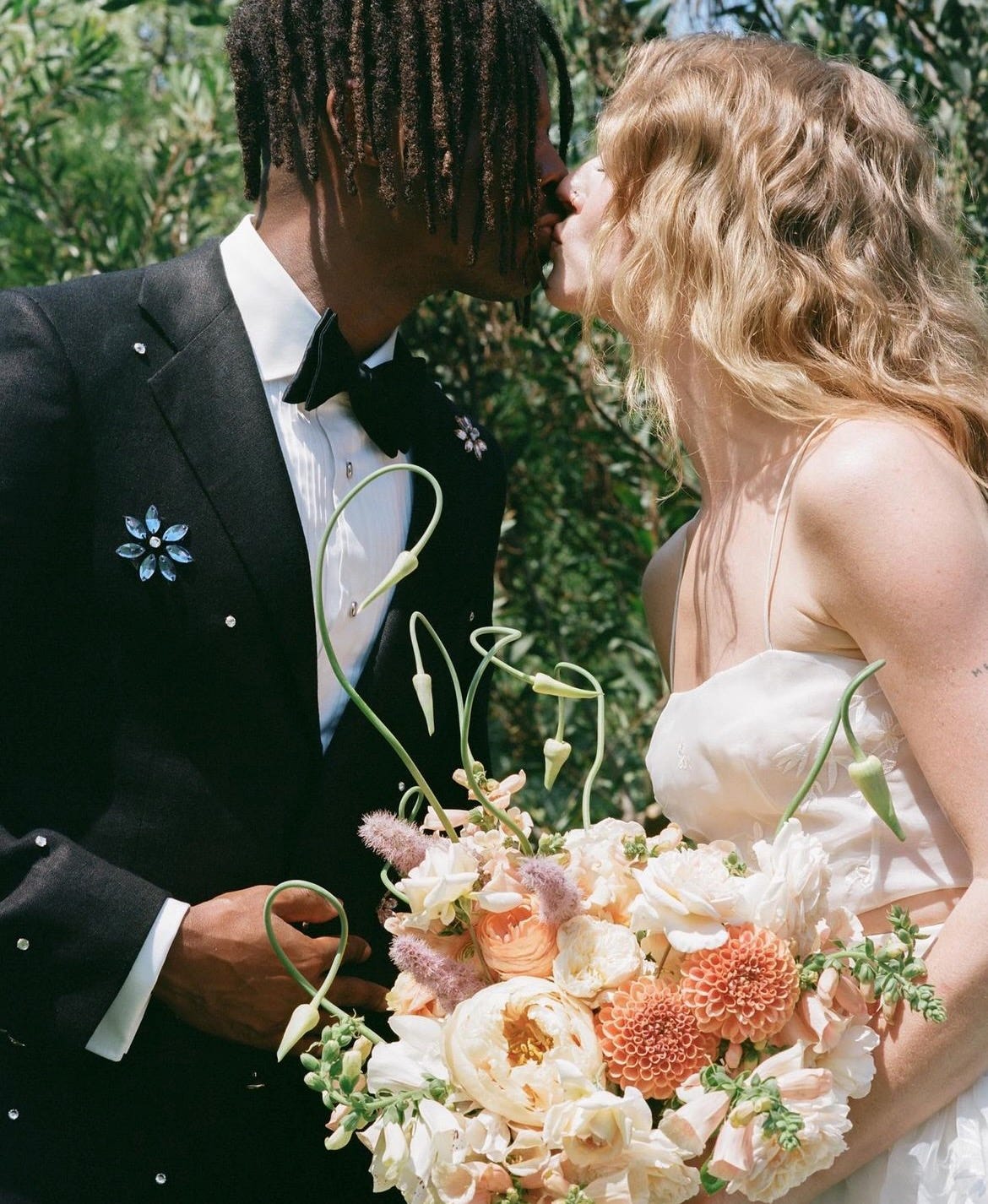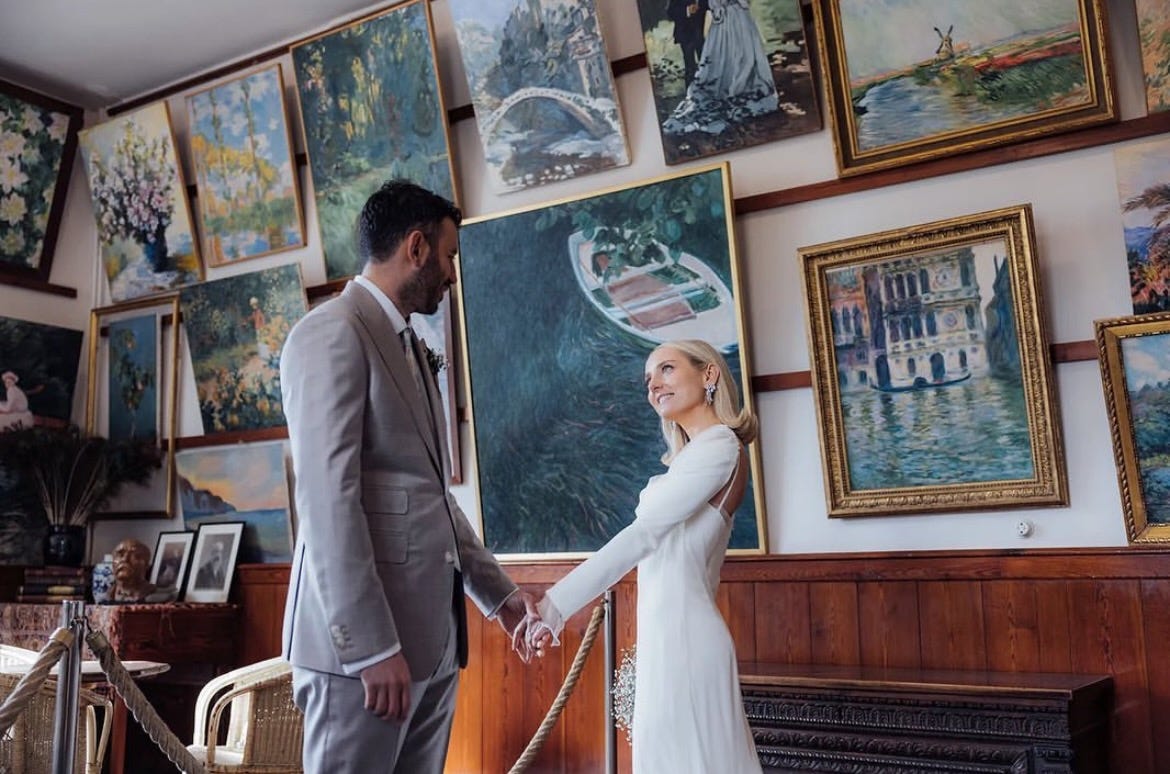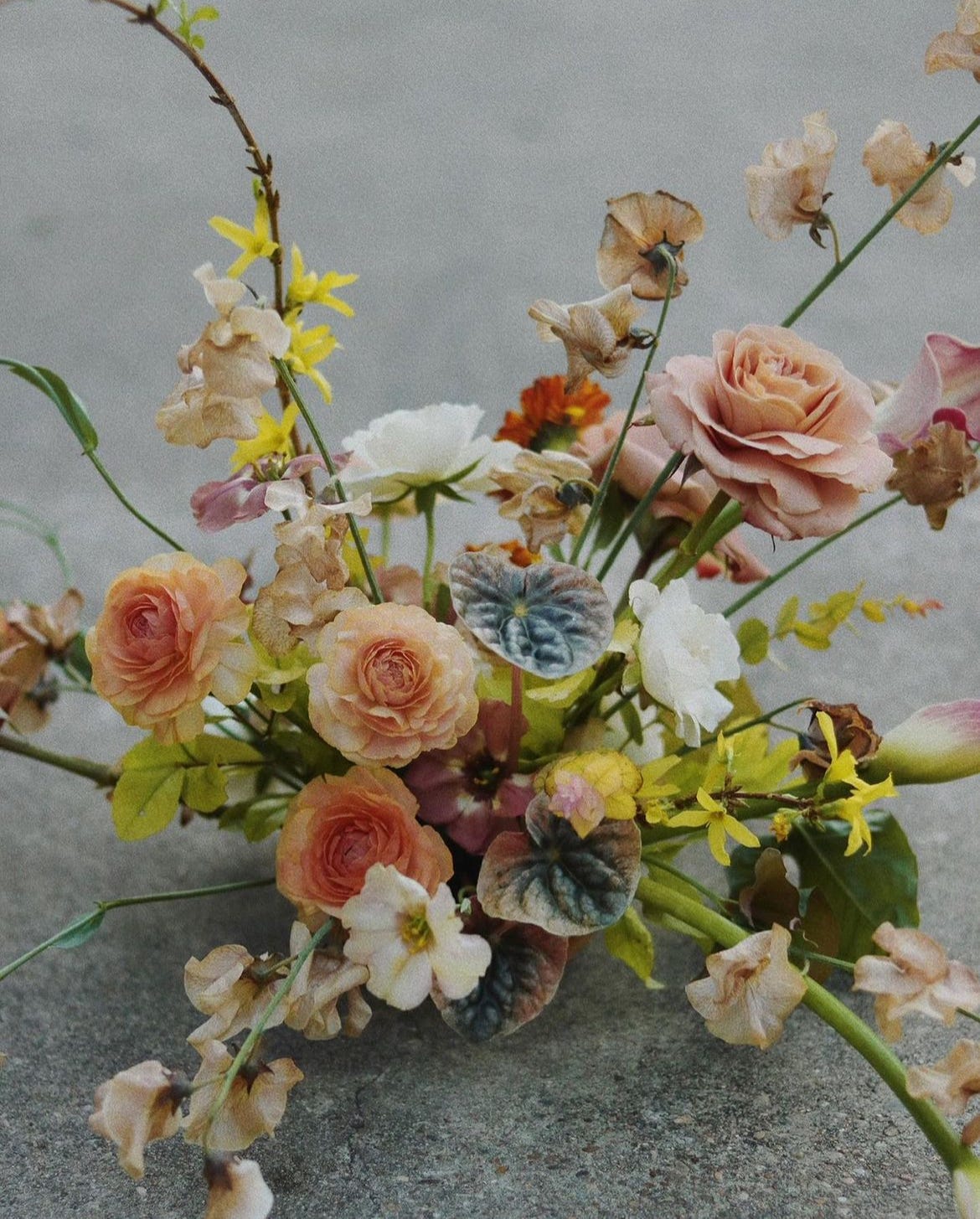I’ve been feeling a lot of big, dark, messy feelings lately, and I haven’t wanted to write about any of them—about anything at all, really. Today’s newsletter has been hanging over me all week, as I’ve spent plenty of time procrastinating in my apartment or at the office. Adulthood involves a lot more watching television than I expected. I can’t write; I want to read, but nothing interests me; so I stare at a screen and slowly rot.
The Instagram algorithm has decided that I am interested in wedding content, so I have marriage on the mind. I love judging other people’s weddings from the depths of broke singledom. It’s perverse, I know.
I somehow discovered two couples who were involved in each other’s weddings—one of which was at Monet’s house in Giverny, France and later featured in Vogue. They all work in entertainment in California, as far as I can tell. I’m always so curious where the money comes from for these things. One of the grooms is a television writer and producer who worked on Orange Is the New Black and The Morning Show, so, okay, fair. The other couple are both small-time actors, so I’m thinking theirs has to be family money—their wedding was much more elaborate and included weeks in Paris both before and after the wedding, then further honeymooning in Italy.
Don’t get me wrong, I’m obsessed with them all. The actress and actor (pictured above) just had a baby, named—wait for it—Claude. My parasocial relationship has commenced.
For the longest time, I didn’t think I wanted to get married or have children. I used to joke with my brother that our mom was made to be a grandmother, but that it was his responsibility to make her one. He didn’t think that was very funny, but I maintain that he’ll almost certainly get married before I do. I’ve also always said that I don’t want to even think about marriage until I’m 30.
The thing about that plan is that a lot of people my age might already be paired off by then. As much as I’d like to tell myself that times have changed, I sense this roiling undercurrent of expectation and even longing for marriage among my generation. Maybe it’s not as strong as when my mom was growing up, but there’s a traditional timeline of which I can’t suppress my awareness, always on the periphery of my vision like a migraine aura.
There’s still a strong “ring by spring” contingency in certain circles at UT. One of my childhood friends just got engaged, too. We were always the odd ones out at our church as artsy, liberal teenagers. I helped her hide a fake ID and stick-and-poke tattoo from her parents for years, even as we drifted apart. Her engagement naïvely came as a shock to me—but they’d been dating for most of college, and they clearly look smitten with each other. So, yeah. I guess it makes sense they’d get married.
But, like, really? We’re doing that now?
For most of my life I was an “old soul” and “wise beyond my years”—coded language for “not cool” and “best friends with my teachers”—but I did have to deal with adult problems earlier than most. Now that I’ve made it to adulthood, I feel like the clock has reset. There’s no way to shortcut one’s 20s. It’s a relief, in a way, to realize that we’re all just posting on LinkedIn, getting our oil changed, and trying not to go into credit card debt in our separate corners of the universe. The way I see it, I’m less of a 22-year-old human and more like a one-year-old adult.
I’ve recently realized there’s more to the story of my aversion to marriage. I went to a tiny, private, Baptist middle school, where we had chapel every Wednesday and took a class on the Bible every year, alongside regular classes like English and algebra. The library wasn’t allowed to have Harry Potter on the shelves because “witchcraft is Satanic.”
Then I went to the High School for the Performing and Visual Arts to study theatre. Needless to say, the culture shock was intense and incredible. I could count every Republican—and every straight male, for that matter—on one hand. That’s how few of each there were among my classmates. I could write an entire book about HSPVA because it’s an unbelievable place—as in, much about it is too bizarre to be believed—and I wouldn’t even be the first. Susan Choi’s Trust Exercise describes the campus in excruciating detail, down to the black and white tiled floors.
High school was unequivocally the worst time of my life; amid a typically awkward adolescence and a long-building mental health struggle, my mom was diagnosed with cancer, and four months later, my parents separated. Around the same time, I began trying to distance myself from the evangelical church in which I was raised. I finally decided I couldn’t go to school where I did and profess a faith that said gay people were sinful and condemned to hell. No theological obfuscations could get me around the cognitive dissonance. Despite the support that my closest friends from church provided during such a traumatic time, I started to turn my back on organized religion altogether.
Looking at it now, I think I threw the baby out with the bath water, so to speak. I didn’t want any part of the traditional lifestyle in which I’d been raised, the bankruptcy of which I was discovering in real time. I wanted to be empowered in my femininity; I wanted a career and bodily autonomy. I didn’t have a vision of marriage or child-rearing that was divorced from the evangelical church—so I gave up on all of it.
As I grew older, I found myself to be undateable. When I got to college, I rushed a lower-tier sorority, and I liked it for a while. But few fraternities would mix with us, and when they did, I questioned why I bothered to show up. I remember, at one of our first mixers, two or three guys picked up the entire 60-girl pledge class from our sorority house to walk us through West Campus to their house. I had the out-of-body observation that we looked like lambs being led to the slaughter. Then we would stand around drinking lukewarm White Claws and, in my case, not playing beer pong. Unsurprisingly, I was not asked to any date events or formals.
I told myself college just wasn’t going to be the place where I found a long-term partner, and I was okay with that at the time. But after graduation, I definitely don’t “go out” enough to meet guys at bars, and all of my coworkers now are married with children. The people—whether friends or potential partners—with whom I would probably get along best are also more likely to stay at home. I’m introverted, insecure, and somewhat of a misanthrope. I don’t know if I’ll meet anyone in this stage of my life either … but what if I just keep saying that until my window has passed? Will I be okay with that?
I think I could be. Many of my favorite people in the world are single women. But I know from speaking to some of these people whom I admire that even in their confidence and contentment with the fulfilling lives they’ve built for themselves, that there’s still sometimes an element of longing or even shame for not conforming to an expected life trajectory. We’re all still unlearning the expectations of the conservative church, I think. (Smarter writers than I have written about the modern marriage market—here, for example—and there are legitimate sociological conclusions to be drawn about the phenomenon I’m lamenting here.)
Recently, I’ve started going back to church. I’ve been so lonely that I’d literally rather face my demons than spend another Sunday morning with my cat sleeping until noon. It’s been an very surprising experience. On Charlotte’s recommendation, I’m going to a church founded for artists and “ex-vangelicals” (a term for those who are unlearning the harm of evangelical Christianity and rediscovering the truth of the Bible). We’ve sung Sufjan Stevens and Sinead O’Connor songs in worship. The preaching team—predominantly women—talks openly about patriarchy and racism, and admits fallibility from the pulpit. It’s almost unrecognizable from the church of my childhood.
It’s also full of families with young children. At one point, a woman leading the liturgy carried her child up to the pulpit with her. There are many young couples, and at least one family who also brings the parents’ parents every Sunday. I’m enamored of the multigenerational community that fills the space.
I still don’t know what I believe about religion, but I’m finally ready to be curious about my faith again. And I’ve realized that there’s a reason why the Bible and society at large venerate familial relationships, why there are entire publications dedicated to weddings that fill my Instagram feed, or “momfluencers” who make a living making content about their kids. These relationships are undeniably rich with meaning. I don’t think that they’re required for human flourishing, but it’s clearer to me now how beautifully marriage or parenthood can facilitate connection to something greater than oneself.
As much as I fear the shame of singlehood as I get older, I also fear the legitimate grief I might feel if I don’t get to realize that part of myself, in partnership with another or as a mother. I want the chance to celebrate with all of my loved ones by throwing the greatest party of my life, or to watch my kids grow up with my friends’ children, the way we all did together. In fact, the friends whom I consider family, I met at church.
This might seem like an obvious conclusion, but for me, it’s something of a revelation. I know that I have my whole life ahead of me, and there’s no use attempting machinations for these things. I’ve done well for myself finding fulfillment and self-actualization in my family and friendships so far, and I know I will continue to do so. I’ll most likely be embarrassed by my naked longing when I read this essay in the future.
I guess this is just to say that being a woman is to be in near-constant ontological crisis.
FOOD FOR THOUGHT
First, I’ve received encouraging pledges from very generous friends, so I’ve decided to take this as a cue to activate paid subscriptions. For now, nothing will change for free subscribers. I started this newsletter first and foremost as a way to practice my writing. I’m so grateful to have you all here, and I want to keep this accessible. Before I put anything behind a paywall, I will let you know.
In the meantime, if you are enjoying this publication, I would be honored if you considered becoming a paid subscriber. The monthly price is less than a latte costs these days! Now on to the fun stuff.
Marriage in the movies:
The title of this essay comes from the following clip, of course.
The best/worst proposal in literary history:
This is television, but it’s profound and worthy of including in this section.
Turns out I shouldn’t have written this newsletter at all and instead just told you to watch Greta Gerwig’s Little Women, which about sums it up.
“I just feel—I just feel like—women—they have minds, and they have souls as well as just hearts. And they’ve got ambition, and they’ve got talent as well as just beauty. And I’m so sick of people saying that love is just all a woman is fit for. I’m so sick of it! But I’m—I’m so lonely.”
1989 (Taylor’s Version)
I’m sure I don’t need to point out to most of you that Taylor Swift released another of her rerecorded albums last week. 1989 has always been one of my favorite albums of hers. This era was when I was peak Swiftie. I famously had a fan blog on Tumblr that she followed and interacted with on more than one occasion, which earned me a seat upgrade on the tour.
Unfortunately, I do not love the way she’s remixed the audio on most of the songs, though I understand that her project has likely changed from when she originally recorded the album. We know now that she was struggling with an eating disorder for most of the original era. Looking back on songs like “New Romantics” with greater disillusion is therefore to be expected, even if the reason I listen to 1989 is to revel in the naïveté of her pop music, rather than to examine the dark irony of my early 20s (that’s what Substack is for, of course!)
That said, the vault tracks are insane. I thoroughly enjoyed her dragging Harry Styles to hell. My favorites are “Now That We Don’t Talk” and “Is It Over Now?”
I respect Taylor Swift because she, too, will write the most devastating shit about relationships that lasted three months. And after this week’s essay especially, it’s nice to remember that she wrote the line, “being this young is art” when she was 24.
The Good Witch (Deluxe)
Importantly, another of my favorite artists released new music on Thursday night. Maisie Peters dropped the deluxe version of her album The Good Witch, with banger lyrics like:
Boy, somebody’s gotta say it
It might cut to the core
Got this far but I’m Joan of Arc
And you’re just a guy on a horse
and
And it’s too late to tell you
But man, you know Yoko never broke up that band
You misunderstood the Beatles
Guess that’s being 22
You misunderstood a lot of things
But yeah, I guess me too
Relevant art I found on Instagram this week:
(The first one’s a carousel, so click to scroll.)












I found your newsletter a few weeks ago and I’m obsessed + relate a little too heavily to a lot of what you write about-- let it be known that someone out there has a parasocial relationship w you (but not in a weird way I promise)!